


The country is already been through the initial hustling created by GST Impact on Businesses in India. The aim of one nation one tax is fulfilled and the year 2018 will be the high time to evaluate its GST impact on the businesses. Some businesses already started their planning to meet the effects of GST quite smartly and quite earlier.
While there will be some positive impacts, the challenge is to be able to consume its negative impacts. Whether an established company or a small start-up, the impact of GST will be everywhere. However, before we check the impacts of GST impact let us understand the overall taxpayer base is now much bigger. Though the threshold is increased, the merger of taxes is bringing countless additional enterprises under the domain of tax.
Blog Index
This brief write-up explains how GST is going to make difference to the businesses in our country. The initial hassles and gripes are obvious as the economy is meeting a big change. Knowing them will make the things bit easier.
The sectors which are most likely to get benefit from the GST impact are consumer durables, FMCG, entertainment, construction materials, automobiles, and logistics. However some business like real estate might see a momentary downslide. In the GST era, the developer or the end consumers will bear the high tax burden for the projects under construction.
Small and Medium Enterprises are driving forces of our economy. The country has more than 3 million SMEs. Combining the state and central taxes through GST impact will largely impact the capital of SMEs. However, the positive impact comes in the form of exemption limit up to Rs. 20 lakhs. The limit is 10 lakhs in some states. The elimination of multiple taxes will reduce cost and time spent on logistics and tax formalities. Doing business will be more convenient with a single taxation. With the increase in the organized businesses, the SMEs are likely to be more competitive globally.
With the introduction of GST, the sectors will be rather organized than before. The provision of single taxation might seem anti-profiteering and the cost is likely to be passed on to the consumers. The likely changes in distribution and logistics will lead to higher inventory. Consequently, the cost of capital is likely to go up. The coming half year will largely clarify the real impacts on the businesses. Much also depends upon the shamelessness offered by the governmental mechanism for registrations, filings, and returns.
The best change about GST is anyhow the eradication of multiple taxes. All the compliance will have to be carried out through online GST portal only. The small and medium businesses and small start-ups don’t have to take the stress of interacting and influencing officers for smooth executions of the compliance. Apparently, many such tedious hassles of the existing tax regime will be reduced or eliminated thoroughly.
Goods and Services Tax impact on businesses in India in a nutshell, is a large reshuffling in Indian economy. While some impacts will be obvious, some will have to be analysed by the economists. Impacts will be now clearer once the fear of dealing with an unknown is settled. The GST might also lead to the birth of a new market for ERP providers and overall IT industry.